Evolution of Psychotherapy
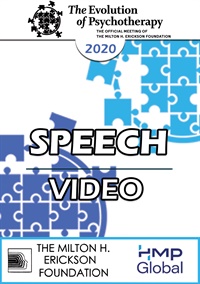
- Average Rating:
- Not yet rated
- Topic Areas:
- Training | Speeches | Psychotherapy | Therapist Development
- Categories:
- Evolution of Psychotherapy | Evolution of Psychotherapy 2020
- Faculty:
- William Miller, PhD
- Course Levels:
- Master Degree or Higher in Health-Related Field
- Duration:
- 1 hour
- Format:
- Audio and Video
- Original Program Date:
- Dec 13, 2020
- Short Description:
- Counseling and psychotherapy are inseparable from the people who provide them. Drawing on six decades of therapeutic research, Dr. Miller will describe eight provider skills that influence client outcomes for better or worse, across a broad range of treatment methods.
- Price:
-
Sale is $29.00
price reduced from Base Price - $59.00
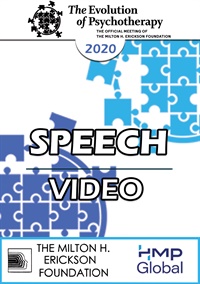
- Average Rating:
- Not yet rated
- Topic Areas:
- Couples Therapy | Sex and Sexuality | Speeches | Marriage
- Categories:
- Evolution of Psychotherapy | Evolution of Psychotherapy 2020
- Faculty:
- Michele Weiner-Davis, LCSW
- Course Levels:
- Master Degree or Higher in Health-Related Field
- Duration:
- 49 minutes
- Format:
- Audio and Video
- Original Program Date:
- Dec 13, 2020
- Short Description:
- One out of every three couples struggles with mismatched sexual desire—a formula for marital disaster. When one spouse is sexually dissatisfied and the other is oblivious, unconcerned, or uncaring, sex isn’t the only casualty; a sense of emotional connection can also disappear. Complicating matters is that fact that many couples (and some therapists) feel uncomfortable discussing sex and remain focused on “Red Herring” issues. This workshop offers a hands-on, collaborative model for addressing the "elephant in the room" and restoring sexual and emotional connection.
- Price:
-
Sale is $29.00
price reduced from Base Price - $59.00
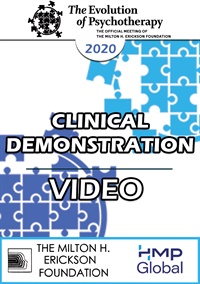
EP20 Clinical Demonstration 11 - Learn to Read Brain Scans: 50 Scans in 60 Minutes - Daniel Amen, MD
- Average Rating:
- Not yet rated
- Topic Areas:
- Neuroscience | Neurobiology | Clinical Demonstrations | Psychotherapy
- Categories:
- Evolution of Psychotherapy | Evolution of Psychotherapy 2020
- Faculty:
- Daniel Amen, MD
- Course Levels:
- Master Degree or Higher in Health-Related Field
- Duration:
- 1 hour
- Format:
- Audio and Video
- Original Program Date:
- Dec 13, 2020
- Short Description:
- Based on the world's largest database of brain SPECT (single photon emission computed tomography) scans, Dr. Amen will teach attendees about brain SPECT imaging and then show 50 cases in 60 minutes, including cases of depression, anxiety, attention deficit hyperactivity disorder, post traumatic stress disorder, schizophrenia, traumatic brain injury, addiction, and dementia.
- Price:
-
Sale is $29.00
price reduced from Base Price - $59.00
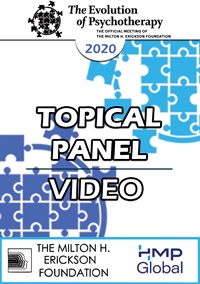
- Average Rating:
- Not yet rated
- Topic Areas:
- Multicultural | Topical Panels
- Categories:
- Evolution of Psychotherapy | Evolution of Psychotherapy 2020
- Faculty:
- Patricia Arredondo, EdD | Robert Dilts, BA | Derald Wing Sue, PhD
- Course Levels:
- Master Degree or Higher in Health-Related Field
- Duration:
- 1 hour
- Format:
- Audio and Video
- Original Program Date:
- Dec 13, 2020
- Short Description:
- All therapists require an understanding of multicultural issues to be effective. Theoretical research findings will be discussed.
- Price:
-
Sale is $29.00
price reduced from Base Price - $59.00

- Average Rating:
- Not yet rated
- Topic Areas:
- Hypnosis | Conversation Hours | Ericksonian Hypnosis and Therapy Techniques
- Categories:
- Evolution of Psychotherapy | Evolution of Psychotherapy 2020
- Faculty:
- Bill O'Hanlon, MS
- Course Levels:
- Master Degree or Higher in Health-Related Field
- Duration:
- 1:01:12
- Format:
- Audio and Video
- Original Program Date:
- Dec 13, 2020
- Short Description:
- EP20 Conversation Hour 09 - Evocation: The Foundation of Ericksonian Hypnosis and Therapy - Bill O'Hanlon, MS
- Price:
-
Sale is $29.00
price reduced from Base Price - $59.00
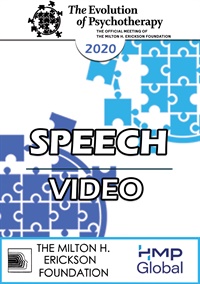
- Average Rating:
- Not yet rated
- Topic Areas:
- Cognitive Behavior Therapy (CBT) | Speeches | Psychotherapy
- Categories:
- Evolution of Psychotherapy | Evolution of Psychotherapy 2020
- Faculty:
- Steven Hayes, PhD
- Course Levels:
- Master Degree or Higher in Health-Related Field
- Duration:
- 1 hour
- Format:
- Audio and Video
- Original Program Date:
- Dec 13, 2020
- Short Description:
- Over the last four decades, evidence-based psychotherapy has been forced into a syndromal box. We have learned some useful things from the "protocols for syndromes" era, but most agree that the end result is inadequate and further progress has slowed to a crawl. Practitioners do not get what they need from research, treatment is difficult to individualize, and processes of change are poorly understood.
- Price:
-
Sale is $29.00
price reduced from Base Price - $59.00
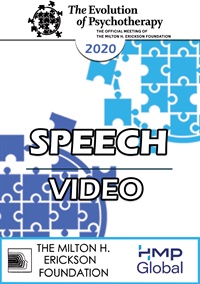
- Average Rating:
- Not yet rated
- Topic Areas:
- Couples Therapy | Speeches | Pain and Healing
- Bundle:
- EP20 Highlights
- Categories:
- Evolution of Psychotherapy | Evolution of Psychotherapy 2020
- Faculty:
- Harriet Lerner, PhD
- Course Levels:
- Master Degree or Higher in Health-Related Field
- Duration:
- 1 hour
- Format:
- Audio and Video
- Original Program Date:
- Dec 13, 2020
- Short Description:
- This speech will identify hidden sources of shame, with clinical and theoretical implications for helping our clients find self-regard, voice, and relational courage in the face of shame.
- Price:
-
Sale is $29.00
price reduced from Base Price - $59.00
Tags: EP20 Highlight
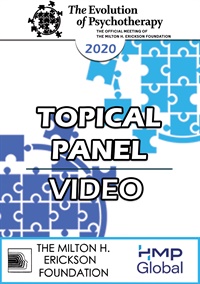
- Average Rating:
- Not yet rated
- Topic Areas:
- COVID | Topical Panels
- Categories:
- Evolution of Psychotherapy | Evolution of Psychotherapy 2020
- Faculty:
- Michael Yapko, PhD | Stephen Porges, PhD | Jeffrey Zeig, PhD
- Course Levels:
- Master Degree or Higher in Health-Related Field
- Duration:
- 1 hour
- Format:
- Audio and Video
- Original Program Date:
- Dec 12, 2020
- Short Description:
- This panel will focus on the COVID-19 pandemic and its impact in the field of Psychotherapy. Panelists will address the pandemic's effect on the psychotherapy community in relation to patient needs, therapy, and stress response. The impact on relationships, and psychological perspectives will be identified. Additional issues include how COVID-19 has affected patients in limitations/barriers/roadblocks/challenges in access to therapy.
- Price:
-
Sale is $29.00
price reduced from Base Price - $59.00
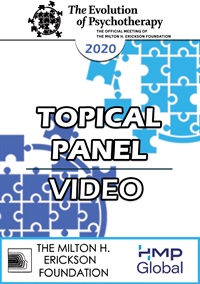
- Average Rating:
- Not yet rated
- Topic Areas:
- Training | Topical Panels | Goals of the Therapist
- Categories:
- Evolution of Psychotherapy | Evolution of Psychotherapy 2020
- Faculty:
- Harville Hendrix, PhD | Helen LaKelly Hunt, PhD | Jack Kornfield, PhD
- Course Levels:
- Master Degree or Higher in Health-Related Field
- Duration:
- 1 hour
- Format:
- Audio and Video
- Original Program Date:
- Dec 12, 2020
- Short Description:
- The process of contracting for change in the initial session will be described and discussed. Methods of targeting goals will be compared and contrasted.
- Price:
-
Sale is $29.00
price reduced from Base Price - $59.00
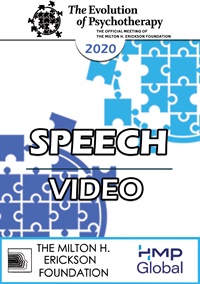
- Average Rating:
- Not yet rated
- Topic Areas:
- Couples Therapy | COVID | Speeches
- Categories:
- Evolution of Psychotherapy | Evolution of Psychotherapy 2020
- Faculty:
- Ellyn Bader, PhD
- Course Levels:
- Master Degree or Higher in Health-Related Field
- Duration:
- 1 hour
- Format:
- Audio and Video
- Original Program Date:
- Dec 12, 2020
- Short Description:
- Increasingly more and more couples are working together or working virtually in the same space. It is estimated that in the United States 43% of small businesses are family-run and 53% of managers share day-to-day management with a spouse. Working together tends to kill romance and take over a couples life.
- Price:
-
Sale is $29.00
price reduced from Base Price - $59.00
Please wait ...

